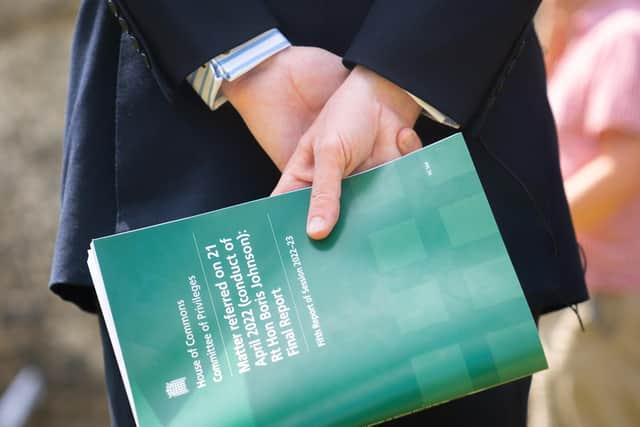What brought Boris Johnson down wasn’t policy but his conduct - Justine Greening
Our democracy’s main accountability mechanism is a General Election, when people decide who they want representing them as their Member of Parliament. That’s a judgement on both the past performance of a government and their sitting member of parliament and what the alternatives locally and nationally are.
But though General Elections only happen every few years, it doesn’t mean there’s no accountability of those leading our democracy in the meantime. In between elections, accountability happens through those Members of Parliament who are elected by their communities holding the Government to account and representing local issues. It’s what Parliament is there to do. Parliamentary rules on ‘honourable’ Members’ conduct matter because they are rules that serve a purpose. That purpose is accountability.
Advertisement
Hide AdAdvertisement
Hide AdI’ve spent many years in politics as a Secretary of State, running three departments in turn. I admit my life would have been far simpler if I had not had to be accountable for my decisions or my departments’ performance. I’d have had lots of time freed up had I not had to face fellow Members of Parliament for scheduled questions in Parliament every three weeks. Or never had an Urgent Question to answer on the floor of the Commons. Or not had to bother responding to the correspondence from constituents and Members of Parliament.


But the reality is all these various means of holding Ministers to account, however challenging, made for far better outcomes for the public. Having to explain myself was part of my role. I felt the accountability meant there was always a healthy pressure on Ministers to do better. And I knew how important that system was, having spent time as a Shadow Minister in opposition pre-2010. Being able to ask questions and get straight answers enabled me to hold a Labour Government to account on behalf of my community and others.
The day to day accountability of Government Ministers to Parliament provides voters with the information and ability to understand what is being done and why. It enables them to form a judgement on their own Member of Parliament and how to cast their vote in the next General Election when it happens. Today’s Parliamentary record, Hansard is free of media spin and enables people to directly follow our democratic debate.
Truth and accountability go hand in hand. Ministers must speak truth to Parliament, otherwise meaningful democratic debate cannot take place. That is why misleading the House of Commons is such a serious matter for a Member of Parliament, let alone a Prime Minister. It is a breach of the standards that enable our democracy to function effectively.
Advertisement
Hide AdAdvertisement
Hide AdThis week the House of Commons Privileges Committee has issued a damning verdict on Boris Johnson that has directly led to his self-imposed departure from the House of Commons. Once called the ‘greased piglet’ by former Premier David Cameron for being able to squeeze out of any difficult situation, Johnson was expected by many to be censured and suspended but not necessarily for a period of time - over 10 days - that would warrant a by-election.
It is an astonishing reversal of fortune for a politician who delivered a Conservative landslide victory three and a half years ago. Johnson’s ability to tap into the political zeitgeist of the day took him to the very top of British politics. It's important to see a distinction between Mr Johnson’s policy stances and the separate issue of his Parliamentary conduct. I strongly agreed with his agenda of ‘levelling up’. What ultimately led to his political demise was not his policy stances or lack of progress. Instead, it was his conduct that brought him down. Johnson seemed incapable of being accountable, as if he did not understand the concept in and of itself. He broke rules because he didn’t seem to recognise that without rules, all we have is anarchy. Perhaps it was his ‘normal’, yet the level of chaos in Number 10 Downing Street was part of why Johson found it hard to pursue any meaningful policy agenda. His mentality as well as his conduct was simply incompatible with the accountability of being Prime Minister. In the end, Boris Johnson's unwillingness or innate incapacity to follow rules has rendered him unable to be part of a British democratic system that explicitly requires accountability. Quite literally, he fought the rules and the rules won.
Where does this leave Rishi Sunak and the Conservative Party? In grave difficulties and facing three difficult by-elections.
The Party has lurched from one leader, Boris Johnson, with a vision but no plans, to one in Rishi Sunak who has plans but no overarching vision. And whilst many in the rest of the country have formed a view on Boris Johnson - 69 per cent believe he knowingly misled Parliament according to one poll - it may prove harder for the Conservative Party to move on from a leader they bought into lock, stock and barrel. The Conservative Party bet big on Boris Johnson. It had the electoral boom and now potentially faces the electoral bust. It’s familiar to those of us who are London Conservatives but Johnson’s chickens may be coming home to roost for the Conservative Party in the wider country now.
Justine Greening, who was born and raised in Rotherham, is a former Secretary of State for Education.